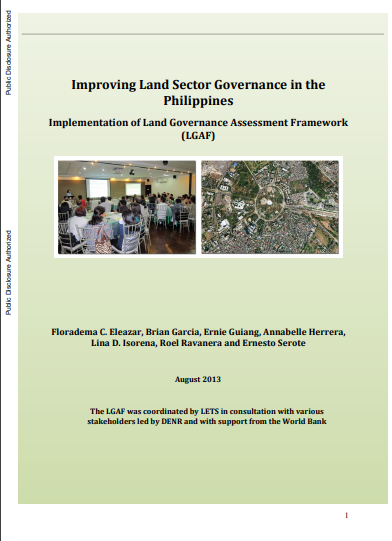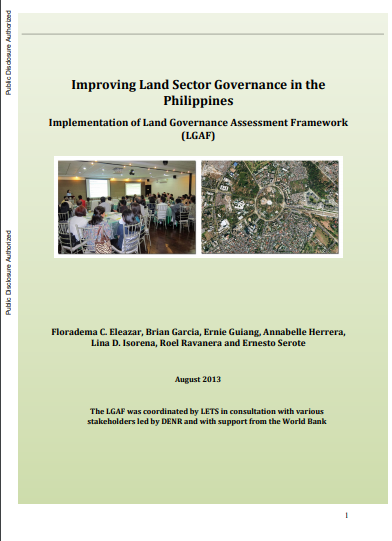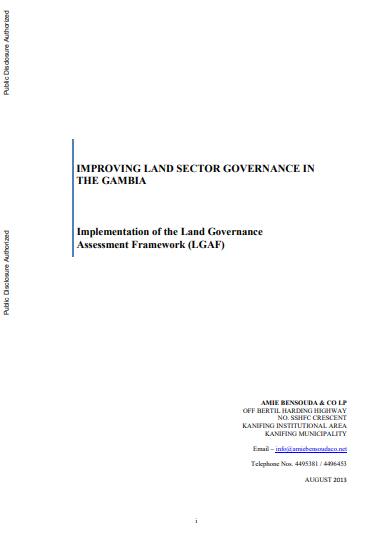The World Bank is a vital source of financial and technical assistance to developing countries around the world. We are not a bank in the ordinary sense but a unique partnership to reduce poverty and support development. The World Bank Group has two ambitious goals: End extreme poverty within a generation and boost shared prosperity.
- To end extreme poverty, the Bank's goal is to decrease the percentage of people living on less than $1.25 a day to no more than 3% by 2030.
- To promote shared prosperity, the goal is to promote income growth of the bottom 40% of the population in each country.
The World Bank Group comprises five institutions managed by their member countries.
The World Bank Group and Land: Working to protect the rights of existing land users and to help secure benefits for smallholder farmers
The World Bank (IBRD and IDA) interacts primarily with governments to increase agricultural productivity, strengthen land tenure policies and improve land governance. More than 90% of the World Bank’s agriculture portfolio focuses on the productivity and access to markets by small holder farmers. Ten percent of our projects focus on the governance of land tenure.
Similarly, investments by the International Finance Corporation (IFC), the World Bank Group’s private sector arm, including those in larger scale enterprises, overwhelmingly support smallholder farmers through improved access to finance, inputs and markets, and as direct suppliers. IFC invests in environmentally and socially sustainable private enterprises in all parts of the value chain (inputs such as irrigation and fertilizers, primary production, processing, transport and storage, traders, and risk management facilities including weather/crop insurance, warehouse financing, etc
For more information, visit the World Bank Group and land and food security (https://www.worldbank.org/en/topic/agriculture/brief/land-and-food-security1
Resources
Displaying 2416 - 2420 of 4907Causes of Deforestation of the Brazilian Amazon
The worldwide concern with deforestation
of Brazilian Amazonia is motivated not only by the
irreversible loss of this natural wealth, but also by the
perception that it is a destructive process in which the
social and economic gains are smaller than the environmental
losses. This perception also underlies the diagnosis,
formulation and evaluation of public policies proposed by
government and non-governmental organizations working in the
Improving Land Sector Governance in the Philippines
Land is considered a vital resource for any nation. It serves as the platform for carrying out
social, cultural and economic activities. Access to land is an important means for promoting
growth and equity and achieving social justice in many countries. The process by which
decisions are made regarding access to and use of land, the manner in which those decisions are
implemented and the way that conflicting interests in land are reconciled are crucial in
determining whether the country has what it takes to derive the desired benefits from this
Improving land sector governance in the Philippines : implementation of land governance assessment framework (English)
Land is a vital resource for any nation. It serves as the platform for carrying out social, cultural, and economic activities. The land governance assessment framework was developed by World Bank and its partners to provide a tool for diagnosis of land governance issues, establish benchmarks, and monitor progress over time. It comprises a set of detailed indicators to be rated on a scale of pre - coded statements.
Improving land sector governance in The Gambia
The Land Governance Assessment Framework (LGAF) is a diagnostic tool to assess the status of land governance at country level using a participatory process that draws systematically on existing evidence and local expertise rather than on outsiders.
Nicaragua - Land Policy and Administration : Toward a More Secure Property Rights Regime
This report centers on the problems
stemming from land issues in Nicaragua. The report's
main recommendations deal with four priority actions:
institutional reform; adjustments to the legal framework;
systematic regularization of land rights; and, firmly
addressing previous land invasions, and preventing future
invasions. The issue of land distribution, and ownership is
especially critical in Nicaragua; indeed, the country









